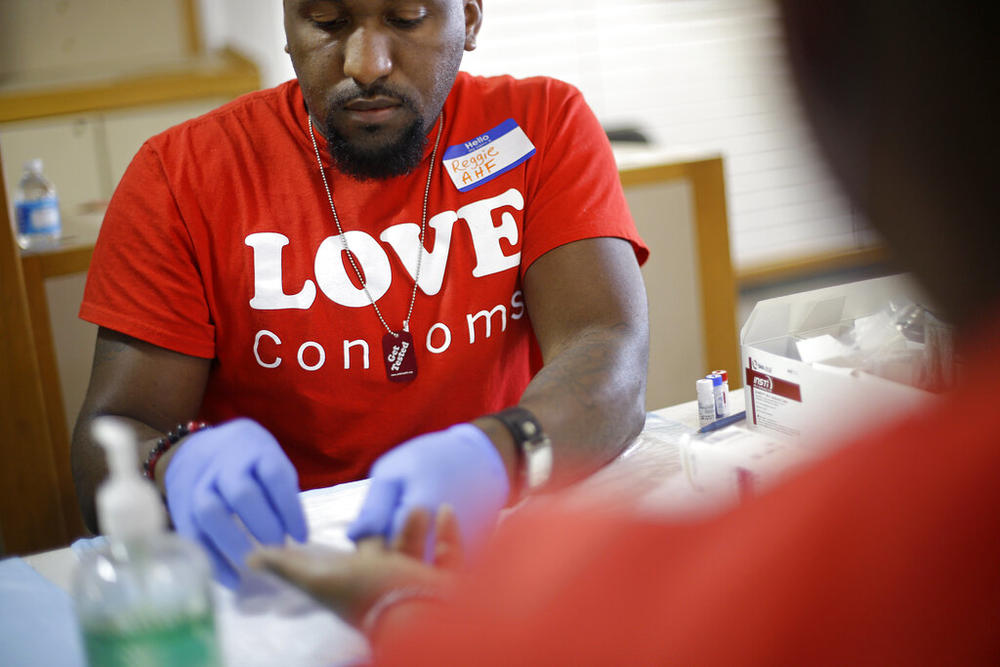
Caption
Reggie Batiste, left, program manager with AIDS Healthcare Foundation, administers a free HIV test as part of National HIV Testing Day, Thursday, June 27, 2013, in Atlanta.
Credit: AP Photo/David Goldman
LISTEN: The Georgia House Public and Community Health Committee voted in favor of a plan to expand Medicaid coverage to Georgians living with HIV. GPB’s Ellen Eldridge has more.

Reggie Batiste, left, program manager with AIDS Healthcare Foundation, administers a free HIV test as part of National HIV Testing Day, Thursday, June 27, 2013, in Atlanta.
Currently, people with Acquired Immunodeficiency Disease — or AIDS — are eligible for Medicaid in Georgia, but they’re not covered when they test positive for the human immunodeficiency virus that causes AIDS.
A proposed bill aims to change that.
Rep. Sharon Cooper, who chairs the Georgia House's Public and Community Health Committee, said it would be better to extend Medicaid to those who are HIV-positive.
Treating HIV-positive people with the proper medications helps prevent full-blown AIDS, she said Feb. 14 in a committee meeting.
“They can live a normal life where they do not transmit the disease,” Cooper said. “However, if they do not get the medicines they need or if they have other illnesses that can debilitate them … things get worse. They get full-blown AIDS.”
House Bill 226, which Cooper is sponsoring, is expected to save lives and taxpayer dollars.
HB 226 is an example of the state picking up the tab for some of the social safety net.
Policy experts with the Georgia Budget and Policy Institute have said for years that expanding Medicaid would help preventative more emergency room level crises.
Georgia’s Medicaid program does not insure all poor adults. Partly as a result, the state had the nation’s third-worst rate of people without any health insurance, according to U.S. Census data from 2018.
The AIDS epidemic in the United States is further burdened geographic disparity. More than half of the new HIV diagnoses are among people living in the South who make up about a third of the population, McGoy said.
The Atlanta is the epicenter for HIV in Georgia, but the metropolitan area is ranked among the top in the country in terms of disease burden, according to the Centers for Disease Control and Prevention.
Cooper estimates that it costs the state about $10,000 a year to treat people with HIV.
“If they go to a full-blown case of AIDS, it's about $30,000 a year,” Cooper said. “So, it's a definite savings to the state to take care of these people.
That $30,000 figure doesn’t include the cost of hospitalization, which can cost taxpayers hundreds of thousands of dollars, she said.
Gilead Sciences is a California-based biopharmaceutical company that focuses on researching and developing antiviral drugs used in the treatment of HIV/AIDS, hepatitis B, hepatitis C, influenza, and COVID-19, which all disproportionately affect communities of color.
The company was named the No. 1 overall philanthropic funder of HIV/AIDS programs by Funders Concerned About AIDS.
Gilead Sciences Director Dr. Shanell L. McGoy said she commends the work Georgia state legislators have done like allowing for syringe exchange programs and decriminalizing fentanyl test strips.
When people at higher risk of contracting HIV — through injecting drugs or risky sexual activities — get connected to these services, there exists opportunity to get them into behavioral health treatment, she said.
Additionally, McGoy commended Gov. Brian Kemp’s fiscal year 2024 budget proposal to increase funding by $931,111 for pre-exposure prophylaxis services — or PrEP — in Gainesville, Rome, Waycross, and Athens.
It’s important not to forget rural communities, particularly those with university or college students, or young people who may be at risk of acquiring HIV, she said.
Kemp’s budget also proposes a $2,000 cost-of-living increase for full-time, benefit-eligible employees of the Department of Public Health, the 159 county health departments, and attached agencies.
That goes a long way in helping raise awareness and reduce the stigma around AIDS, McGoy said, including internalized stigma.
“The internal stigma related to HIV really is the negative thoughts and stereotypes that one may have about HIV, and then applying them to themselves, right,” McGoy said. “So, for example, there may be a lot of self-blame about acquiring a positive HIV status. There may be a lot of guilt.”
Gilead Sciences’ COMPASS Initiative partners have really flipped the script or changed the narrative around that internalized stigma, McGoy said.
“There's still so much work that needs to occur around HIV,” McGoy said, “and some of those are really the social determinants of health that will benefit the entire community, such as employment and housing, and especially reducing hate and stigma and discrimination among people living with HIV, as well as the LGBTQ community, particularly Black trans women who experience violence at enormous rates and in so many communities across the country.”
The bill to expand Medicaid to Georgians living with HIV passed committee on Feb. 14.
Georgia Health Initiative is a non-partisan, private foundation advancing innovative ideas to help improve the health of Georgians. Learn more at georgiahealthinitiative.org